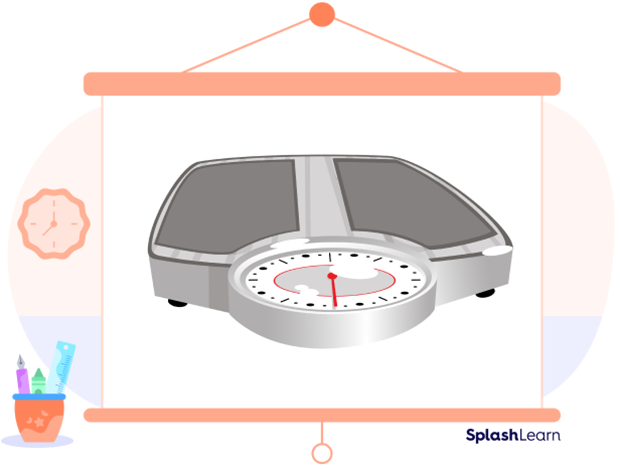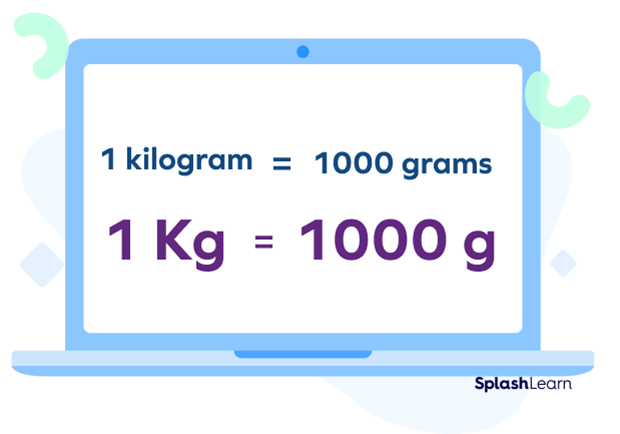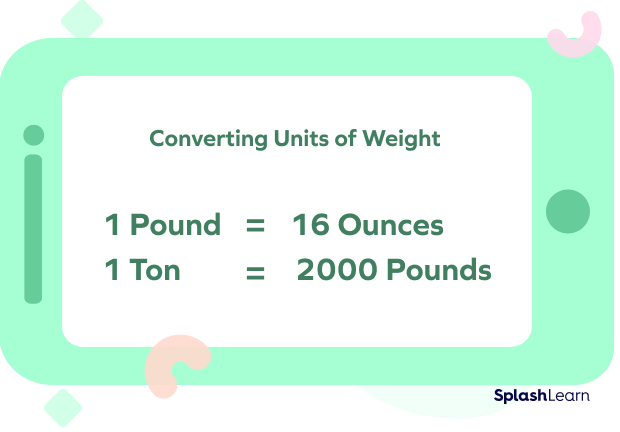Weight Measurement
Do you know your weight? Well, we measure our weights using a weighing machine. It looks something like this:

Recommended Games
What is Weight Measurement?
Weight determines how heavy an object or quantity of a substance is. A body with more weight is considered heavy, like an elephant or a bus. On the other hand, a body of less weight is called light. A feather, a leaf, and a bubble are all light in weight. We can also compare two or more objects and determine which is heavier or lighter.

For instance, the adult dog in the picture is heavier in terms of weight. And the cute little puppy is lighter.
We have different weighing machines or scales to determine the weights of different things. The weight of an object can be measured using different types of weighing scales. A scale or balance is a device used to measure weight or mass. These are also known as mass scales, weight measurement scales, mass balances, and weight balances.

Recommended Worksheets
Units of Weight Measurement
Metric Units of Weight Measurement
Using instruments, the gram (g) and kilogram (kg) measure how heavy an object is. The International System of Units (SI) is the metric system used universally as a standard for measurements. The SI unit of mass (or weight) is the kilogram (kg). When we buy groceries, they are measured in weight units such as grams and kilograms.
Gram: A gram is a metric unit of mass (or weight). It is abbreviated as g.
1,000 grams $= 1$ kilogram
Kilogram: A kilogram is a measure of mass (or weight). It is abbreviated as kg.
1 kg $=$ 1000 grams
Here is a chart used for the conversion of metric units of weight.

Customary Units of Weight Measurement
This is the US Standard Unit (English Unit or Customary Unit). The US customary units for measuring weight are ounces, pounds, and tons.
Ounce: An ounce is an imperial measure of weight. It is abbreviated as oz. An ounce is equivalent to 28.35 grams.
Also, 16 ounces $= 1$ pound
Pound: A pound is an imperial unit of mass (or weight). It is abbreviated as lb. A pound is defined as 0.454 kg.
Also, 1 pound $= 16$ ounces
Fun Fact about Pounds: “lb” is an abbreviation for the Latin word libra, the seventh sign of the zodiac symbolized by scales.
Ton: A ton is a standard unit for measuring mass (or weight).
1 ton $= 1000$ kg
Also, 1 ton $= 2000$ pounds
Here is a chart that is used for the conversion of customary units of weight.

Fun Facts!
- The weight of an object can vary as per its geographical location on Earth. This is because gravity is weaker in certain locations.
- A person standing at sea level weighs slightly more than they would on top of a mountain peak.
- An object or person on the moon would weigh 16.5% of its weight on earth.
- Earth weighs 81 times more than the moon.
Solved Examples
1. Which is heavier, a football or a baseball?

Solution: A football.
A football is heavier than a baseball. This is because football has more weight.
2. Convert 8 pounds to ounces.
Solution:
We know that 1 pound $= 16$ ounces
So, 8 pounds $= 8 \times 16$ ounces $= 128$ ounces
Therefore, 8 pounds $=128$ ounces.
3. Convert 12 tons to kg.
Solution:
We know that 1 ton $= 1000$ kg
So, 12 tons $= 12 \times 1000$ kg $= 12,000$ kg
Practice Problems
Weight Measurement - Definition With Examples
Convert 4 pounds to ounces.
We know that 1 pound $= 16$ ounces
So, 4 pounds $= 4 \times 16$ ounces $= 64$ ounces
Rachel has 32 ounces of butter. Help her calculate how much it weighs in pounds.
1 pound $= 16$ ounces
So, 32 ounces $= 32 \div 16 = 2$ pounds
Convert 5 tons to pounds.
1 ton $= 2000$ pounds
So, 5 tons $= 5 \times 2000$ pounds $= 10000$ pounds
Frequently Asked Questions
What is the SI unit of weight?
The International System of Units (SI) is the metric system used universally as a standard for measurements. The SI unit of mass is the kilogram (kg).
How can we measure weight?
The weight of an object can be measured using different types of weighing scales. A scale or balance is a device used to measure weight or mass. These are also known as mass scales, weight scales, mass balances, and weight balances.
Which units do weighing scales employ to measure weight?
Weighing scales use standard units such as milligrams, grams, and kilograms to measure the weight of different objects.
What are weights made up of?
A weight is a piece of metal known to weigh a definite amount. Nowadays, weights are available in plastic and various other materials.
What are the US Standard Units of weight?
The US Standard Units or the Customary System measures weight or mass in ounces, pounds, and tons.




























